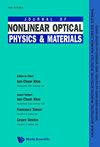寻找Pca21相铁电体
IF 2.3
4区 物理与天体物理
Q2 OPTICS
引用次数: 0
摘要
近年来,铪基铁电材料因其能将铁电性保持在10nm以下,且与微电子流线具有良好的兼容性而受到广泛关注。然而,它们铁电性的物理起源仍然不完全清楚,尽管它通常归因于极性Pca21正交相。高温准电相(四方相或立方相)在布里渊区中心不具有软模式,因此铁电畸变必须用四方相中三个声子模式之间的三线性耦合来解释。由于Pca21相的极性,有必要探索可能具有铁电性的新材料,这反过来对铁电铪的微观理论评价有很大的帮助。本工作基于材料基因组工程的思想,发现了一系列类半铁电体,如LaSeCl、LaSeBr、LuOF和YOF,它们具有足够的自发极化值和相对有利的极性相自由能。详细讨论了它们的共同特点和个体差异。特别是,预测了一种很有潜力的铁电材料Pca21相LuOF,并推荐了进一步的实验合成和研究。本文章由计算机程序翻译,如有差异,请以英文原文为准。
In search of Pca21 phase ferroelectrics
In recent years, hafnia-based ferroelectrics have attracted enormous attention due to their capability of maintaining ferroelectricity below 10 nm thickness and excellent compatibility with microelectronics flow lines. However, the physical origin of their ferroelectricity is still not fully clear, although it is commonly attributed to a polar Pca21 orthorhombic phase. The high-temperature paraelectric phases (the tetragonal phase or the cubic phase) do not possess a soft mode at the Brillouin zone center, thus the ferroelectric distortion has to be explained in terms of trilinear coupling among three phonon modes in the tetragonal phase. It is necessary to explore new materials with possible ferroelectricity due to the polar Pca21 phase, which in turn should be very helpful in evaluating the microscopic theory for ferroelectric hafnia. In this work, based on the idea of the Materials Genome Engineering, a series of hafnia-like ferroelectrics have been found, exemplified by LaSeCl, LaSeBr, LuOF and YOF, which possess adequate spontaneous polarization values and also relatively favorable free energies for the polar phase. Their common features and individual differences are discussed in detail. In particular, a promising potential ferroelectric material, Pca21 phase LuOF, is predicted and recommended for further experimental synthesis and investigation.
求助全文
通过发布文献求助,成功后即可免费获取论文全文。
去求助
来源期刊
CiteScore
3.00
自引率
48.10%
发文量
53
审稿时长
3 months
期刊介绍:
This journal is devoted to the rapidly advancing research and development in the field of nonlinear interactions of light with matter. Topics of interest include, but are not limited to, nonlinear optical materials, metamaterials and plasmonics, nano-photonic structures, stimulated scatterings, harmonic generations, wave mixing, real time holography, guided waves and solitons, bistabilities, instabilities and nonlinear dynamics, and their applications in laser and coherent lightwave amplification, guiding, switching, modulation, communication and information processing. Original papers, comprehensive reviews and rapid communications reporting original theories and observations are sought for in these and related areas. This journal will also publish proceedings of important international meetings and workshops. It is intended for graduate students, scientists and researchers in academic, industrial and government research institutions.

 求助内容:
求助内容: 应助结果提醒方式:
应助结果提醒方式:


